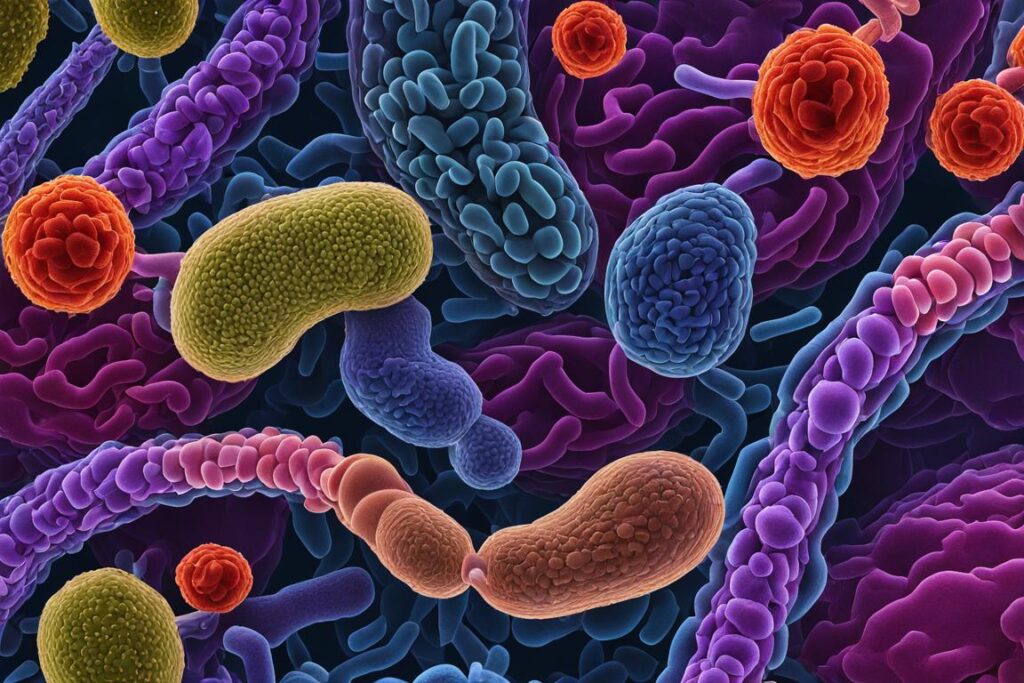Certain lifestyle practices, including exercising regularly and eating a nutritious diet rich in protein and fiber, can help naturally balance your hormones. Hormones are chemical messengers that play a major role in controlling appetite, weight, and mood. A nutritious diet and other healthy lifestyle habits may help improve hormonal health and allow you to feel and perform your best.
When it comes to hormone regulation, the food we eat is key. By incorporating hormone balance tips and hormone balance foods into your daily routine, you can support your body’s natural hormone production and maintain overall hormone health.
Key Takeaways:
- Eating a nutritious, hormone-balancing diet can help improve hormonal health.
- Regular exercise is essential for maintaining hormone balance and managing insulin levels.
- Weight management is crucial for hormonal balance and overall health.
- Maintaining a healthy gut microbiome can support optimal hormone regulation.
- Minimizing added sugar intake can help prevent hormonal disruptions.
The Importance of Protein in Hormone Balance
Consuming adequate amounts of protein is crucial for maintaining hormone balance in the body. Protein plays a vital role in hormone production and regulation, as it provides the essential amino acids needed for the synthesis of protein-derived hormones.
Protein-derived hormones are responsible for controlling various physiological processes, including growth, energy metabolism, appetite, and stress response. These hormones help regulate the body’s functions and maintain overall hormonal balance.
Research has shown that protein intake can have a significant impact on appetite control. Consuming protein-rich foods decreases the production of the hunger hormone ghrelin, making you feel more satisfied and reducing hunger cravings.
Additionally, protein stimulates the production of hormones that promote feelings of fullness and satiety. These hormones signal the brain to stop eating, leading to weight loss and increased appetite control. Including protein in your meals can support your weight management goals and contribute to a balanced hormonal profile.
“Protein is an essential nutrient for hormone balance, as it provides the building blocks for protein-derived hormones and helps regulate appetite and satiety.”
Protein-Derived Hormones and Their Functions
| Protein-Derived Hormone | Function |
|---|---|
| Ghrelin | Stimulates appetite |
| Leptin | Suppresses appetite and promotes satiety |
| Insulin | Regulates blood sugar levels and promotes the storage of nutrients |
| Peptide YY (PYY) | Reduces appetite and increases feelings of fullness |
By consuming an adequate amount of protein in your diet, you provide the necessary raw materials for the production of these critical hormones. This, in turn, helps to maintain hormone balance and supports various physiological processes in the body.
Make sure to include a variety of protein sources in your meals, such as lean meats, fish, poultry, eggs, legumes, and dairy products. This will ensure that you obtain all the essential amino acids needed for optimal hormone production and regulation.
Having a well-balanced diet that includes sufficient protein intake is an important aspect of supporting hormone balance and overall health.
The Role of Exercise in Hormone Balance
Regular exercise plays a vital role in maintaining hormonal health. Not only does it contribute to overall physical well-being, but it also has a significant impact on hormone balance. Engaging in physical activity helps regulate insulin levels, increase insulin sensitivity, and manage blood sugar, thereby preventing insulin resistance.
Exercise also improves hormone receptor sensitivity, leading to better hormonal response and functioning. It enhances blood flow to the muscles, ensuring optimal nutrient delivery and waste removal. Additionally, physical activity stimulates the production of muscle-maintaining hormones that tend to decline with age, promoting muscle strength and preserving lean muscle mass.
It’s important to note that exercise doesn’t necessarily mean intense workouts or strenuous activities. Even low-intensity exercises like walking, yoga, or light resistance training can provide significant benefits for hormonal health. The key is to engage in regular physical activity that suits your fitness level and preferences.

Exercise not only positively impacts hormone levels but also contributes to overall quality of life. Check out the following list for an overview of the benefits of exercise on hormonal health:
- Reduces insulin levels and increases insulin sensitivity
- Improves hormone receptor sensitivity
- Enhances blood flow to muscles
- Boosts production of muscle-maintaining hormones
- Increases strength and lean muscle mass
To optimize hormonal health, aim for at least 150 minutes of moderate-intensity aerobic activity or 75 minutes of vigorous aerobic activity each week. Additionally, include strength training exercises at least twice a week to improve muscle strength and integrity.
Expert Insight
“Engaging in regular physical activity is essential for hormonal health. Exercise helps regulate insulin levels, improve insulin sensitivity, and enhance hormone receptor sensitivity. Additionally, it stimulates the production of muscle-maintaining hormones, benefiting overall hormonal balance and maintaining muscle strength.” – Dr. Sarah Johnson, Endocrinologist
The Impact of Weight on Hormone Balance
Maintaining a moderate weight is crucial for hormonal balance. Weight gain, especially obesity, can lead to hormonal imbalances that have significant implications for insulin sensitivity and reproductive health. Obesity is associated with a variety of hormonal complications that can disrupt the normal functioning of the endocrine system.
One of the key hormonal issues related to weight gain is insulin resistance. Insulin is an important hormone that helps regulate blood sugar levels. However, excess weight can interfere with insulin sensitivity, making it harder for cells to respond to insulin properly. This can lead to high blood sugar levels and, ultimately, type 2 diabetes. It is important to note that insulin resistance is not only a consequence of weight gain but can also contribute to weight gain and obesity, creating a vicious cycle.
Moreover, excess weight can have adverse effects on reproductive health. Obesity is known to disrupt the delicate balance of reproductive hormones, including estrogen and testosterone. These disruptions can lead to irregular menstrual cycles, fertility problems, and complications during pregnancy. In addition, obesity is associated with an increased risk of polycystic ovary syndrome (PCOS), a hormonal disorder that affects women and can lead to difficulties conceiving and other health issues.
Reducing Weight for Hormonal Health
Fortunately, losing excess weight can have a positive impact on hormonal health. By adopting a hormone-balancing diet and focusing on portion control, individuals can achieve and maintain a healthy weight, improve insulin sensitivity, and reduce the risk of hormonal complications associated with obesity.
Here is an example of a hormone-balancing diet plan:
- Include a variety of colorful fruits and vegetables to provide essential vitamins, minerals, and antioxidants.
- Incorporate lean sources of protein, such as chicken, fish, tofu, or legumes, to support muscle maintenance and hormone production.
- Choose whole grains for fiber and to support healthy digestion.
- Include healthy fats like avocados, nuts, and olive oil to stabilize blood sugar levels and promote hormone balance.
- Avoid or limit processed foods, sugary beverages, and foods high in added sugars, as they can contribute to weight gain and disrupt hormonal balance.
It’s important to note that weight loss should be approached holistically, considering factors such as overall health, body composition, and individual goals. Consulting with a healthcare professional or registered dietitian can provide personalized guidance and support to help achieve and maintain a healthy weight for optimal hormonal health.
Embracing a hormone-balancing diet and losing excess weight can have a transformative effect on hormonal health. By prioritizing weight management and overall well-being, individuals can enhance insulin sensitivity, improve reproductive health, and reduce the risk of hormonal complications associated with obesity.

| Benefits of Weight Loss on Hormonal Health | Consequences of Excess Weight on Hormonal Health |
|---|---|
| Improved insulin sensitivity | Increased risk of insulin resistance and type 2 diabetes |
| Enhanced reproductive health | Disruption of reproductive hormones and increased risk of fertility problems |
| Reduced risk of PCOS | Higher likelihood of developing polycystic ovary syndrome (PCOS) |
| Lower risk of hormonal complications | Hormonal imbalances and increased susceptibility to related health issues |
Gut Health and Hormone Balance
Maintaining a healthy gut microbiome is essential for hormone balance. The gut microbiome plays a crucial role in influencing hormones by modulating insulin resistance and regulating feelings of fullness. One way the gut microbiome supports hormone balance is through the production of short-chain fatty acids (SCFAs) when fermenting fiber in the gut.
SCFAs have multiple benefits for hormone regulation. They aid in weight management by increasing fullness hormones, which can help control appetite and prevent overeating. Additionally, SCFAs support gut health by regulating the integrity of the gut barrier and reducing the production of a harmful substance called lipopolysaccharide (LPS), which can trigger inflammation and disrupt hormone regulation.
However, an imbalance in the gut microbiome, often caused by obesity and certain bacteria, can disrupt hormone regulation and increase the risk of insulin resistance. This can lead to hormonal imbalances and metabolic dysfunction.

To support optimal hormone balance, it’s important to take care of your gut health. A high-fiber diet can provide the necessary nutrients for a healthy gut microbiome. Foods rich in fiber, such as fruits, vegetables, whole grains, legumes, and nuts, promote the growth of beneficial gut bacteria and help maintain a diverse microbiome.
Reducing sugar intake is also key to supporting gut health and hormone balance. Excessive sugar consumption can disrupt the balance of bacteria in the gut, leading to an unhealthy microbiome that may contribute to insulin resistance and hormonal imbalances. Limiting the consumption of sugary foods and beverages can help maintain a healthy gut and optimize hormone regulation.
Hormone-Balancing Foods for Gut Health
| Food | Benefits |
|---|---|
| Fruits and Vegetables | Provide fiber and essential nutrients for a healthy gut microbiome. |
| Whole Grains | Rich in fiber, which promotes the growth of beneficial gut bacteria. |
| Legumes | Contain fiber and resistant starch, supporting a diverse gut microbiome. |
| Nuts and Seeds | Provide fiber and healthy fats for gut and hormonal health. |
| Fermented Foods | Yogurt, sauerkraut, and kimchi contain beneficial probiotics that support a healthy gut. |
By incorporating these hormone balance foods into your diet and paying attention to your gut health, you can support optimal hormone regulation and promote overall wellness.
The Impact of Sugar on Hormone Balance
Minimizing added sugar intake is crucial for hormone balance. Sugar, especially fructose, can promote insulin resistance and disrupt hormone function. High fructose intake has been linked to increased insulin resistance and disruptions in the gut microbiome.

Lowering sugar intake, especially from sugary drinks, can improve hormone health and reduce the risk of obesity, diabetes, and other diseases. Choosing hormone-balancing foods that are low in added sugar is essential for maintaining optimal hormonal balance.
Stress Reduction for Hormone Balance
Managing stress is crucial for maintaining hormone balance in your daily life. Chronic stress can disrupt the delicate equilibrium of your hormonal system, leading to a range of symptoms and potential health issues. One hormone closely linked to stress is cortisol, often referred to as the “stress hormone.” Elevated cortisol levels can result in increased appetite, particularly for sugary and high-fat foods, which can lead to weight gain, obesity, and even insulin resistance.
To counteract the negative effects of chronic stress on your hormones, it’s essential to incorporate stress reduction techniques into your daily routine. Here are some effective stress reduction techniques that can help lower cortisol levels, prevent appetite stimulation, and alleviate the symptoms of hormonal imbalance:
- Meditation: Engaging in regular meditation practice can effectively reduce cortisol levels and promote relaxation.
- Yoga: Practicing yoga has been shown to lower cortisol levels, increase feelings of well-being, and help manage stress.
- Deep breathing exercises: Taking slow, deep breaths can activate the body’s natural relaxation response and reduce cortisol levels.
- Progressive muscle relaxation: This technique involves systematically tensing and relaxing different muscle groups to release built-up tension and reduce stress.
- Spending time in nature: Being in natural environments, such as parks or forests, can have a calming effect on the body and mind and help reduce stress.
“Engaging in stress reduction techniques such as meditation, yoga, and relaxation exercises can lower cortisol levels, prevent appetite stimulation, and alleviate the symptoms of hormonal imbalance.”
By incorporating these stress reduction techniques into your daily routine, you can effectively manage and reduce chronic stress, allowing your hormones to find a healthier balance. Taking time each day to devote to stress reduction can have a significant positive impact on your hormonal health, overall well-being, and quality of life.

| Chronic Stress and Hormonal Balance | Stress Reduction Techniques |
|---|---|
| Elevated cortisol levels | Meditation |
| Increased appetite stimulation | Yoga |
| Weight gain and obesity | Deep breathing exercises |
| Insulin resistance | Progressive muscle relaxation |
| Spending time in nature |
The Importance of Healthy Fats for Hormone Balance
Incorporating healthy fats into your diet is crucial for achieving hormone balance. These essential fats, including monounsaturated fats and omega-3 fatty acids, play a vital role in hormone production, stabilize insulin and blood sugar levels, and reduce inflammation in the body. By including hormone balance foods rich in healthy fats, you can optimize your hormonal health and support overall well-being.
Monounsaturated fats are known for their beneficial effects on hormone balance. They contribute to the production of hormones, such as estrogen and testosterone, which play a crucial role in various bodily functions. These fats also help stabilize insulin levels and promote healthy blood sugar regulation, reducing the risk of insulin resistance and metabolic disorders.
Omega-3 fatty acids are another key component for maintaining hormonal balance. They help increase insulin sensitivity, reducing the risk of insulin resistance and promoting better glucose control. Furthermore, omega-3 fatty acids have anti-inflammatory properties, which can help alleviate inflammation-related hormone imbalances. By incorporating fatty fish, such as salmon and sardines, into your diet, along with other omega-3-rich sources like walnuts and flaxseeds, you can support hormonal health and reduce inflammation in the body.
Medium-chain triglycerides (MCTs) are a type of healthy fat that has shown promising effects on hormone balance. MCTs can increase calorie burning and improve insulin sensitivity, making them beneficial for weight management and blood sugar control. Including MCT-rich sources like coconut oil in your hormone balancing diet can help boost your metabolism and support insulin regulation.
Including hormone balance foods in your diet that are rich in healthy fats can promote overall hormonal health and reduce the risk of inflammation-related hormone imbalances.
Key Benefits of Healthy Fats for Hormone Balance:
- Support hormone production and regulation
- Stabilize insulin and blood sugar levels
- Reduce inflammation in the body
- Improve insulin sensitivity and glucose control
- Boost metabolism and calorie burning
By incorporating hormone balance foods rich in healthy fats, such as avocados, nuts, fatty fish, and olive and coconut oil, into your diet, you can optimize your hormonal health and support overall well-being.

| Foods Rich in Healthy Fats for Hormone Balance | Monounsaturated Fats | Omega-3 Fatty Acids | Medium-Chain Triglycerides (MCTs) |
|---|---|---|---|
| Avocado | ✓ | ||
| Olive Oil | ✓ | ||
| Nuts (Almonds, Walnuts) | ✓ | ||
| Fatty Fish (Salmon, Sardines) | ✓ | ||
| Flaxseeds | ✓ | ||
| Coconut Oil | ✓ |
The Role of Sleep in Hormone Balance
Getting enough quality sleep is crucial for maintaining hormone balance. Sleep affects several key hormones, including insulin, cortisol, leptin, ghrelin, and growth hormone. When sleep is compromised, it can have a negative impact on these hormones and disrupt the delicate balance within the body.
The Impact of Sleep on Insulin and Cortisol Levels
Sleep deprivation can impair insulin sensitivity, leading to higher blood sugar levels and an increased risk of insulin resistance. Additionally, inadequate sleep can elevate cortisol levels, the stress hormone. Elevated cortisol levels are associated with weight gain, especially in the abdominal area, and can contribute to insulin resistance over time.
Sleep and Appetite Regulation
Quality sleep plays a vital role in regulating appetite. Lack of sleep can disrupt the balance of the hunger hormones leptin and ghrelin, leading to increased appetite and cravings for high-calorie foods. This can make it more challenging to maintain a healthy weight and can contribute to hormonal imbalances.
The Importance of Restorative Sleep for Hormonal Balance
Restorative sleep is the phase of sleep when the body repairs and regenerates tissues, including the release of growth hormone. Growth hormone is essential for tissue growth, muscle repair, and overall hormonal balance. Without adequate restorative sleep, the body may experience imbalances in hormone production and function.
It is recommended to aim for at least 7-9 hours of high-quality sleep per night to support optimal hormonal health. Establishing a consistent bedtime routine, creating a comfortable sleep environment, and practicing relaxation techniques can help improve the duration and quality of sleep.
“Sleep is essential for maintaining hormone balance and overall well-being.”
| Hormone | Effect of Inadequate Sleep |
|---|---|
| Insulin | Impaired insulin sensitivity, increased blood sugar levels, higher risk of insulin resistance |
| Cortisol | Elevated cortisol levels, increased stress response, potential weight gain |
| Leptin | Reduced levels, increased appetite and cravings |
| Ghrelin | Elevated levels, increased appetite and hunger |
| Growth Hormone | Disrupted release and reduced levels, potential hormonal imbalances |

The Importance of Fiber in Hormone Balance
Consuming a high-fiber diet is essential for hormone balance. Dietary fiber plays a crucial role in stabilizing blood sugar levels, reducing the risk of insulin resistance, and promoting digestive regularity. This is particularly important for overall hormonal functioning.
Fiber-rich foods help manage appetite and keep you feeling fuller for longer. By slowing down the digestion process, fiber helps regulate blood sugar levels and prevents spikes and crashes that can disrupt hormone levels. It also promotes a healthy gut microbiome, which is crucial for optimal hormone functioning.
Adding sources of fiber to your diet can support hormonal balance and overall health. Incorporate foods such as chia seeds, whole grains, fruits, and vegetables into your meals and snacks. These fiber-rich options not only provide essential nutrients but also contribute to maintaining a well-balanced hormonal system.

Fiber is a versatile nutrient that can be present in both soluble and insoluble forms. Soluble fiber dissolves in water and forms a gel-like substance in the digestive tract, helping to regulate blood sugar and cholesterol levels. Insoluble fiber, on the other hand, adds bulk to the stools and supports healthy digestion and regular bowel movements.
By including a variety of high-fiber foods in your diet, you can support digestive regularity, control blood sugar levels, and promote overall hormonal functioning. Aim to consume at least 25-30 grams of fiber per day for optimal health benefits.
The Role of Diet in Hormone Balance: Expert Insights
While diet alone cannot treat a hormonal imbalance, a well-balanced diet plays a significant role in supporting hormonal health. Good nutrition can provide the body with the energy and nutrients needed to metabolize hormones effectively and support overall health.
Experts recommend the following dietary practices to promote hormone balance:
- Minimize processed foods: Processed foods often contain additives, unhealthy fats, and high levels of sugar, which can disrupt hormone function. Opt for whole, unprocessed foods whenever possible.
- Consume a plant-forward Mediterranean-style diet: The Mediterranean diet emphasizes fruits, vegetables, whole grains, legumes, nuts, and olive oil. This eating pattern is rich in essential nutrients and healthy fats, promoting hormone regulation and overall well-being.
- Incorporate quality protein and healthy fats: Protein is vital for hormone production, and healthy fats play a role in stabilizing insulin and blood sugar levels. Including sources of lean protein, such as chicken, fish, tofu, and legumes, along with healthy fats like avocados, nuts, and seeds, can support hormone balance.
- Increase fiber intake: Dietary fiber helps regulate blood sugar, reduces the risk of insulin resistance, and promotes digestive regularity, which is essential for hormonal functioning. Include fiber-rich foods like whole grains, fruits, vegetables, and legumes in your meals.
- Combine diet with regular exercise: Regular physical activity helps manage hormone levels, improves insulin sensitivity, and supports overall hormonal health. Aim for a combination of aerobic exercise, strength training, and flexibility exercises.
“A well-balanced diet is key to maintaining hormonal balance. By choosing whole, nutrient-dense foods and minimizing processed options, you provide your body with the necessary building blocks for healthy hormone production and regulation.” – Dr. Emily Johnson, Registered Dietitian
By following these expert recommendations, you can optimize your nutrition and support a healthier hormone balance.
Hormone-Balancing Foods
When it comes to hormone balance, certain foods can offer additional benefits. Incorporating these hormone-balancing foods into your diet can further support hormonal health:
| Foods | Benefits |
|---|---|
| Salmon | Rich in omega-3 fatty acids that reduce inflammation and support hormone production. |
| Broccoli | Contains compounds that aid in estrogen metabolism and promote hormone balance. |
| Flaxseeds | High in lignans, which have estrogenic properties and help balance hormone levels. |
| Yogurt | Contains probiotics that support gut health and consequently influence hormone regulation. |
| Walnuts | Rich in omega-3 fatty acids and other nutrients that promote hormone balance and brain health. |
Note: It’s important to remember that individual responses to specific foods may vary. If you have specific concerns or conditions related to hormone balance, consult with a healthcare professional or registered dietitian for personalized guidance.
By incorporating hormone-balancing foods into a well-balanced diet, you can provide your body with the nutrients it needs to support optimal hormonal health.
Conclusion
Achieving hormone balance is crucial for overall wellness. By incorporating healthy lifestyle habits, such as following a balanced diet, engaging in regular exercise, managing stress levels, prioritizing quality sleep, and consuming a high-fiber intake, individuals can support optimal hormonal health. While a hormone balancing diet alone cannot fix a hormonal imbalance, it plays a vital role in maintaining hormonal balance and supporting overall well-being. It is always recommended to consult with a healthcare professional if you suspect a hormonal imbalance in order to receive a proper diagnosis and personalized treatment plan.
By prioritizing a hormone balance lifestyle, individuals can enhance their well-being, improve mood, regulate weight, and increase energy levels. Implementing hormone balance tips, such as choosing hormone balance foods, engaging in hormone balance exercises, and adopting stress reduction techniques, can have a positive impact on hormonal health.
Remember, hormone regulation is a complex process, and the proper functioning of hormones is essential for overall health. By making conscious choices and maintaining a hormone balance lifestyle, individuals can take proactive steps towards achieving optimal hormonal health.
Also Read : What To Consider Before Starting A Ketogenic Diet
FAQ
Q: What is a hormone balancing diet?
A: A hormone balancing diet is a dietary approach aimed at optimizing hormone health and addressing hormone imbalances through specific food choices and meal plans.
Q: What are the signs of hormone imbalance?
A: Signs of hormone imbalance may include weight gain, fatigue, irregular periods, mood swings, and difficulty sleeping.
Q: How can diet help with hormone imbalance?
A: A well-balanced diet, rich in high fiber foods, can help support hormone health, regulate blood sugar levels, and maintain a healthy hormone balance.
Q: What foods can naturally balance hormones?
A: High fiber foods, healthy fats like olive oil, phytonutrient-rich fruits and vegetables, and lean proteins can help naturally balance hormones.
Q: Can a hormone balancing diet help women with hormonal imbalances?
A: Yes, a hormone balancing diet, along with lifestyle changes, may help women manage hormonal imbalances and improve overall well-being.
Q: How does insulin relate to hormonal balance?
A: Insulin is a hormone responsible for regulating blood sugar levels, and maintaining balanced insulin levels is essential for overall hormonal balance.
Q: What are some dietary tips to support hormone health?
A: Eating a high fiber diet, consuming healthy fats, managing body weight, and reducing intake of processed sugars can all help support hormone health.
Q: What are the benefits of a high fiber diet for hormone balance?
A: A high fiber diet can optimize overall health and wellness, support healthy body weight, and reduce the risk of hormonal imbalances associated with body fat.
Q: How important is consulting with a healthcare professional when following a hormone balancing diet?
A: It’s important to consult with a healthcare professional before making significant dietary changes to ensure that the chosen approach aligns with personal health needs and goals.
Q: Can a hormone balancing diet help both female and male hormonal imbalances?
A: Yes, a hormone balancing diet and lifestyle changes can be beneficial for both female and male hormonal imbalances by promoting overall wellness and hormone health.








Leave A Comment